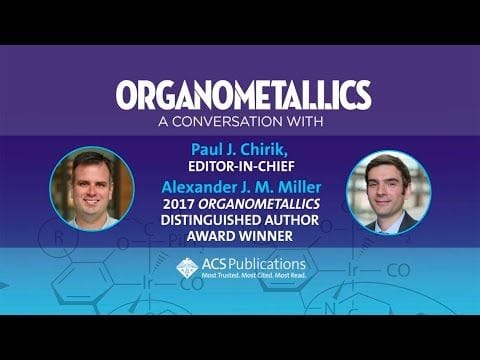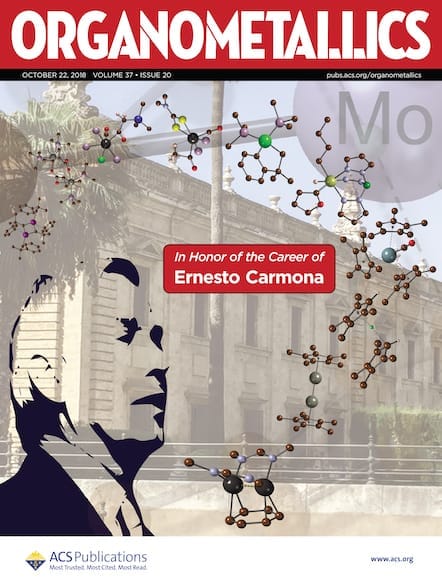Alexander J. M. Miller, Assistant Professor at University of North Carolina at Chapel Hill, is the winner of the 2017 Organometallics Distinguished Author Award.

Alexander J. M. Miller, Assistant Professor at University of North Carolina at Chapel Hill, is the winner of the 2017 Organometallics Distinguished Author Award. Organometallics, the ACS Division of Organic Chemistry, and the ACS Division of Inorganic Chemistry sponsor this annual award, which recognizes the author of an exceptional article published in Organometallics in the previous two calendar years. The award is given to the author of an article that emphasized the importance of organometallic chemistry and had a profound impact on organic and inorganic chemistry as a whole.
“The committee chose Alex from a deep and talented pool of nominees, and the decision was influenced by his impactful 2016 article on methanol carbonylation, overall impact, and visibility in the field of organometallic chemistry, especially from those in the early career demographic,” says Paul J. Chirik, Editor-in-Chief of Organometallics. “His impact on various areas of fundamental organometallic chemistry, especially at the interface of alternative energy science, was also a highlight.”
Award-Winning Research
Alex was selected for this award based on these three valuable articles published in Organometallics:
- Modulating the Elementary Steps of Methanol Carbonylation by Bridging the Primary and Secondary Coordination Spheres
Organometallics, 2016, 35 (17), pp 3074–3086
DOI: 10.1021/acs.organomet.6b00607 - Diverse Cation-Promoted Reactivity of Iridium Carbonyl Pincer-Crown Ether Complexes
Organometallics, 2016, 35 (3), pp 306–316
DOI: 10.1021/acs.organomet.5b00786 - Connecting Neutral and Cationic Pathways in Nickel-Catalyzed Insertion of Benzaldehyde into a C–H Bond of Acetonitrile
Organometallics, 2015, 34 (19), pp 4669–4677
DOI: 10.1021/acs.organomet.5b00405
Read all of Alexander J. M. Miller’s articles from ACS Publications.
As winner of the 2017 Organometallics Distinguished Author Award, Alex will receive a $3,000 honorarium and travel and hotel accommodations to attend and a present at two sessions in his honor at the 2017 ACS Fall National Meeting in Washington, D.C. – one with the ACS Division of Inorganic Chemistry on Sunday, August 20, and one with the ACS Division of Organic Chemistry on Monday, August 21. Organometallics and the Divisions encourage you to attend both sessions and will provide more details on the specific times when they become available.
Interviews with Alexander J. M. Miller
Last month, Alex visited Organometallics Editor-in-Chief Paul J. Chirik at Princeton to talk about his research, how his passion for organometallic chemistry developed, and how he’s developing the next generation of researchers. Watch part of Alex and Paul’s conversation in this video and read more of their interview below. The video interview between Editor-in-Chief Paul Chirik and Professor Alex Miller was conducted in the student and postdoctoral office space which adjoins the Chirik research laboratory that is seen in the backdrop. The area where the conversation occurred was outside of the experimental laboratory space and thus does not require using personal protective equipment.
What do you love about organometallic chemistry; why did you choose to pursue this field of research?
I love the chemical diversity of organometallic molecules, reactions, and applications. It is amazing to me that the field continues to innovate, from new motifs in bonding to new chemical transformations. The balance of synthesis, catalysis, and mechanistic inquiry drew me to organometallic chemistry, as did thinking about how to address big challenges in chemistry using these tools. One of the wonderful things about working in the field is getting to be part of an amazingly supportive and engaged community of organometallic chemists.
Can you tell us briefly about your current research interests? Do you think there are 1-2 results from your lab that have made a significant impact on the field?
The development of “environmentally responsive” catalysts has emerged as a theme in my group. We are developing catalysts with activity and selectivity modulated by stimuli, such as cations or protons, present in the surrounding medium.
This has led to some fun discoveries. We have used aza-crown ether macrocycles as tunable hemilabile ligands that support cation-tunable small molecule activation and catalysis. I hope that the strategy of controlling the ability of a substrate to bind to the metal center will be broadly applicable.
We have also learned a lot about how to trigger reactions of organometallic hydride complexes upon light absorption, which is helping us think about new approaches to efficiently utilize solar energy for bond-forming reactions.
What do you anticipate working on in the future?
More organometallic chemistry! I love thinking about new directions and new projects — chemistry always works great on paper. In general, I’m excited about the role organometallic catalysis might play in tapping into new carbon feedstocks to access chemical building blocks: from carbon dioxide to plant matter to waste materials, each new feedstock raises interesting fundamental questions and poses exciting opportunities.
Is there anything else you’d like to share?
I am sharing this award with my group of amazing graduate students, postdoctoral scholars, and undergrads. It has been an absolute joy to watch their enthusiasm, creativity, and hard work lead to exciting discoveries. I also want to express my gratitude to all of the amazing mentors who helped inspire my love of organometallic chemistry.

